Digital transformation is an emerging trend, but some companies may not succeed in it. To achieve success, leveraging a digital transformation framework that assists your organization as a roadmap can help.
We’ll provide you with our digital transformation framework and five other frameworks from consulting firms like McKinsey, Accenture, Cognizant, BCG, and Gartner to guide you to success.
What is AIMultiple digital transformation framework?
1. Identify digital transformation objectives
Let’s start with your organization’s digital transformation objectives. Digital transformation project objectives mostly focus on improving customer experience and profitability via improved pricing or operational efficiency. Different digital transformation objectives can be set or prioritized depending on your business’s industry, size, market share, etc. We will explain each possible objective based on company characteristics:
- Digitizing products & services: According to studies, two-thirds of a company’s competitive edge comes from its customer experience. Therefore, companies must provide customers with state-of-the-art products & services to gain a competitive advantage. Especially in B2C businesses within retail, insurance, and banking industries, need to focus on a customer-centric approach since end consumers value both the user experience and the pricing of the product.
- Optimizing processes: Every business contains a series of repeated processes, for example, in manufacturing, insurance, marketing, HR, or finance departments. Digital transformation helps enhance these processes with digital tools, achieving internal collaboration and improved employee performance, increased automation rate in repetitive processes, improved production output, etc. Some business targets as a result of these efforts can be:
- Cost optimization
- Improved compliance
- Revenue improvement via higher quality products or more personalized pricing
- Business agility
- Creating new business models: Advances in technology can enable your organization to monetize different products & services. Companies can create new revenue channels by entering adjacent markets, such as Apple’s Apple Card.
2. Formulate a digital transformation strategy
After deciding on your digital transformation objectives, it is time to plan your path to achieve those goals.
Digital transformation projects should aim for end-to-end transformation, which is why your business’s digital maturity decides your next move in the digital transformation journey.
As seen below, there are three paths to digital transformation, and the best path for your company depends on its digital maturity, objectives, industry, and competitive pressures.
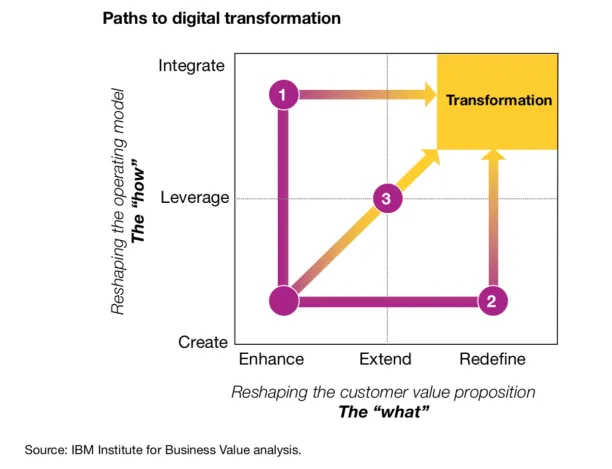
Path 1: Create and integrate digital operations first. Then enhance the customer value proposition based on new processes
For industries such as B2B manufacturing, mining, and government, where customer expectations are more modest and the product is either a physical asset or well-established services, changing the way your organization operates is the most suitable strategy for digital transformation.
Automating some operations and processes can help you reduce costs while shifting your workforce’s focus to more value-added tasks.
Path 2: Improve customer value proposition with digital content, insight, and engagement. Then focus on integrating digital operations
Industries such as financial services, insurance, and retail, where new revenue-based services can be offered via online and mobile devices, should focus on improving the value they propose to customers. Key questions should be:
- How can we make the lives of customers easier?
- Digital platforms and omnichannel technology can help create a frictionless conversation between customers and the company.
- What can your company do to better serve customer needs?
- Capturing feedback from customers
- Emotionally engaging with customers
- Personalized products and services
- Service speed
Path 3: Build a new set of capabilities around the transformed customer value proposition and operation model in lock-step
If you have enough resources and both objectives are equally important, you can handle the transformation of operations and customer value proposition simultaneously.
3. Decide on the necessary technologies
Since you chose your digital transformation strategy, now you need to decide which technologies will enable you to achieve your objectives. Technology selection depends on your use case. There are some specific technologies that you can use based on the strategic path you chose:
- Path 1 technologies:
- Automation testing,
- RPA,
- Digital twins,
- IoT,
- Smart contracts,
- Process mining,
- Task mining,
- Analytics,
- Predictive maintenance,
- AUT (Autonomous things)
- Path 2 technologies:
- Customer intelligence,
- Personalization engine,
- Recommendation engine,
- Omnichannel,
- Chatbots.
Digital transformation technologies are not limited to this list. If you want to learn more about digital technologies and their vendors, feel free to check our vendor database, where we have 8000+ companies in 100+ categories.
4. Establish a competent technology leadership
Though 87% of businesses believe that digital will disrupt their industry, 87% acknowledged that they don’t have the right leadership. Success in digital transformation depends on leadership as much as on technological capabilities. Transformational leadership eases the integration of digital culture, which we will explain in the next step. Some tips for digital transformation leaders are:
- Agility & continuous improvement mindset: Your Minimum Viable Products (MVP) may succeed or fail. You should continue on change management and apply the lessons learned to your next MVP.
- Design thinking: You should re-frame problems in human-centric ways, which includes five phases:
- Empathise with your users
- Define your users’ needs, their problem, and your insights
- Ideate by challenging assumptions and creating ideas for innovative solutions
- Prototype to start creating solutions
- Test solutions
- Action-oriented: The time for formulating long-term plans in armchairs is over. Innovative organizations rely on fast decision-making and bias for action to conduct fast, low-cost tests and learn quickly.
Amazon’s leadership principles are also a great example for tech leadership, even though there is potential to shorten their list.
5. Train the staff and integrate a digital culture within the organization
Digital culture is the work environment where every employee is able to communicate and discuss with leaders about innovation while leaders are encouraging employees to take risks, fail fast, and learn. Digital culture includes experimentation, collaboration, employee involvement, and training. While establishing a digital culture is hard and requires internal leadership, training is rather easy, and companies have access to various partners and tools for that:
- Consulting companies: Digital transformation consulting companies formulate digital strategy, implement technologies, build digital products, and help with employee training. These services should complement internal efforts; relying purely on consulting to upskill the workforce would be expensive.
- Technology vendors: Almost every vendor provides training for their product so that you can get the most out of it and keep purchasing it or renewing the subscription.
- Online courses: For specific technologies such as RPA and augmented analytics, where learning programming is rather easy for business users, tech-specific online courses can be used to train the team.
What is digital transformation?
Digital transformation involves using the latest technologies to enhance existing processes and offer new and improved services and products to customers. It aims to create value by changing how businesses operate and deliver value to customers.
What is a digital transformation framework?
A digital transformation framework is a roadmap of digital strategies that guide your business in a competitive, evolving business landscape. It is a reference point and root of digital transformation projects. By identifying the goals of digitization, it aims to improve business digitization processes.
Why is it important?
According to McKinsey’s research, 70 percent of large-scale transformation programs fail. Common pitfalls are resistance to changing culture, lack of leadership, and poor cross-functional collaboration. A framework can help organizations avoid these pitfalls by demonstrating a roadmap to success. It provides an agreed-upon business-wide approach so that employees and executives don’t stray from goals during agile, evolving business conditions.
Numerous consultancies have formulated digital transformation frameworks for their clients. We see these common patterns in most frameworks:
- Digitized business model
- Talent enhancement within the enterprise
- Customer-centric products and services
- Innovative culture
- Collaborative leadership
Other frameworks from different leading consulting companies
Cognizant’s framework
The digital transformation framework has four main components: customer relations, processes and systems, products and services, and organization.
Digitizing Customer Experience
In order to maximize customer satisfaction and lifetime revenue from a customer, companies are collecting data of customers and providing personalized products to individuals. Customers expect to engage with the company 24/7 from all available channels; omnichannel interaction and services are important for a successful digital transformation.
Digitizing Products & Services
Companies need to focus on selling customers a journey rather than a product. This can only happen if companies insert a digital tag that enables them to analyze customer behavior and allows them to interact with customers.
Digitizing Operations
Automating operational processes makes organizations cost-efficient and more agile. Agility is an essential characteristic for a firm because increasing competitiveness in the market obligates organizations to act quickly.
Digitizing Organization
Companies need to achieve a new organizational model that involves humans and machines together. The labor force should transfer into processes that are about designing, auditing, and innovating rather than operating processes. A culture that is open to change and prioritizes improvement is an essential driver to evolve through digital. Organizations should encourage innovations so that new technical capabilities can be implemented to help employees adopt the digital world and gain the skills and knowledge they require to transform.
BCG framework
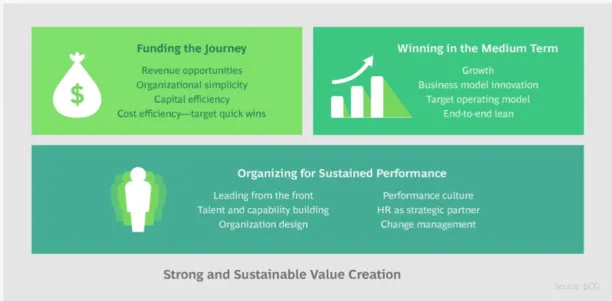
BCG divides the digital transformation process into three layers: short-term quick wins, medium-term plans, and long-term sustainability and transformation.
Funding the journey
Digital transformation is a time-consuming process, and an organization’s digital investments may fail to generate returns greater than the cost of capital during this process. However, boards and shareholders always expect to see immediate results. Therefore, businesses should come up with short-term initiatives that will provide quick cash to fund the upcoming long-term initiatives.
Winning in the medium term
This layer is where the realization of transformation starts across the organization. Businesses focus on redesigning their business and operating models. Digital initiatives are mostly about the way the company delivers products and services to its customers. Businesses identify customer segments and offer products and services to each segment. The results of these initiatives are expected to be seen in the medium term.
Organizing for sustained performance
Culture change among executives and employees is a key indicator of the success and sustainability of digitization. Without an innovative culture, digital transformation is destined to fail. Executives should enable those working within them to contribute, grow, innovate, and be more productive. Organizations should design a culture that supports people’s high performance.
Gartner
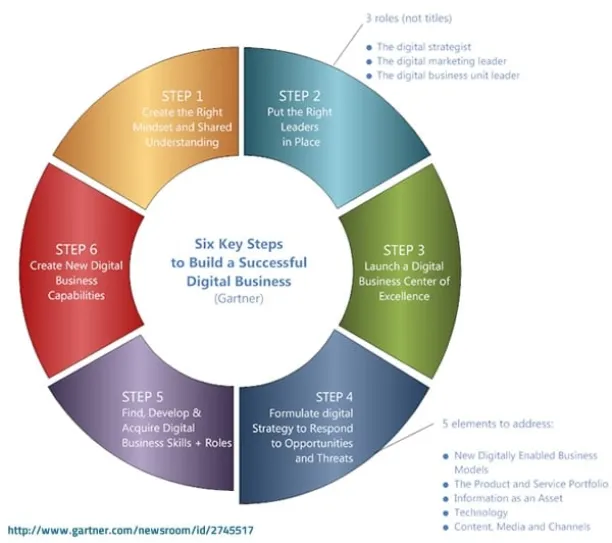
Accenture
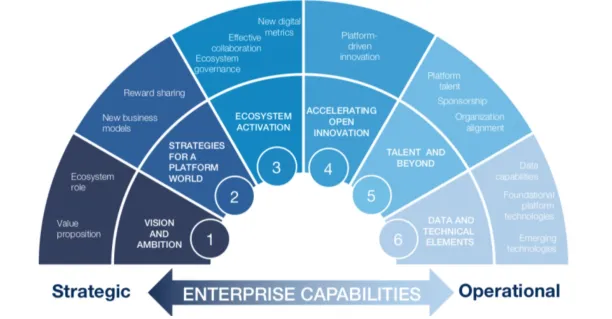
Mckinsey
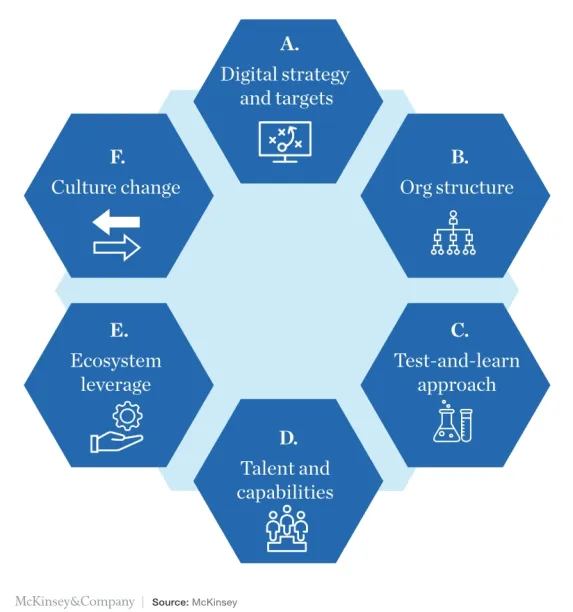
For more on digital transformation, feel free to read our articles on the topic:
- 30 digital transformation cases to inspire your transformation
- Digital transformation with the top 5 digital solutions
If you still have questions about digital transformation, we would like to help:


Comments
Your email address will not be published. All fields are required.